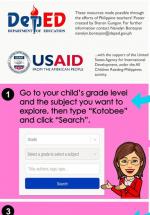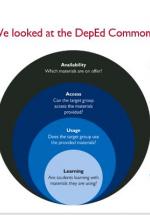East Asia/Pacific
Comprehensive Rapid Literacy Assessment [CIES Presentation]

The CRLA was initially conceived as a 5-minute start-up reading assessment designed to help teachers quickly determine the reading profiles of their G1-G3 learners, and develop appropriate reading instructional strategies. The main goal is to identify children who need additional support in reading. The CRLA was developed in response to the extended break that learners experienced over the summer of 2020 due to the pandemic. After 32 weeks of no class, teachers needed a rapid, easy to use tool, to determine what level of readiness and support the returning children needed. The beginning of school year tasks focused on letter sounds, isolated words and sentence in reading in MT (G1), Filipino (G1-G2) and English (G1-G3).
In the Philippines, learners are expected to transition from their mother tongue (MT) to Filipino and English (L2 and L3 respectively) by grade 4. However, the earliest standardized assessment used in the Philippines is for Filipino starting in G3 and English starting in G4. Prior to the CRLA, there were no existing standardized tools or systems used to assess in the MT. It was also a tool that could be administered remotely (online or even over the phone) which proved critical for schooling in the new normal where face to face classes were not permitted. Thus, the CRLA met the needs of teachers who were missing such a tool in their early grade assessment toolbox.
The CRLA was initially piloted in November 2020 with select schools. The experience of the pilot led DepEd to scale up the CRLA to all schools in the ABC+ Target Regions. The feedback from the schools and teachers who utilized the CRLA was encouraging. Many schools used the results of the CRLA to develop remedial and focused reading programs in the context of the new normal and identify the struggling readers to provide additional support.
Based on the success of the beginning of school year RLA, the Department of Education requested ABC+ to help develop middle and end of year assessments that would align to their curricular competencies. Keeping to the same criteria (rapid and easy to administer and analyze), the team incorporated listening comprehension, oral reading fluency and reading comprehension tasks for end of year administration. At the request of DepEd, ABC+ is currently in the process of expanding the number of MT languages supported by the CRLA and incorporating it into their operations manual for mother tongue-based multi-lingual education.

Nepal: Assessing Early Grade Reading Outcomes the Cost-effective Way [CIES 2022 Presentation]

Policy linking is a standard-setting methodology, long used in many countries, to set benchmarks (or cut scores) on learning assessments that allow those countries to determine what percentage of students in their country are meeting minimum proficiency requirements for key skills such as reading and math. While it is an old standard-setting methodology, its use has been extended to help countries set benchmarks that will allow reporting against global standards. Policy linking allows countries to use their existing national and/or regional assessments to report against Sustainable Development Goal (SDG) 4.1.1: “Proportion of children and young people in Grade 2 or 3 (4.1.1a), at the end of primary education (4.1.1b), and at the end of lower secondary education (4.1.1c) who achieve at least a minimum proficiency level in reading and mathematics.” It works by linking assessments to the Global Proficiency Framework (GPF), a framework developed by global reading and math content experts based on current national content and assessment frameworks across more than 25 countries. The GPF provides performance expectations/ standards for learners in Grades 1-9 in reading and mathematics. By linking existing national and regional assessments to the GPF,
countries and donors are able to compare learning outcomes across language groups in countries as well as across countries and over time, assuming all new assessments are subsequently linked to the GPF.
In this roundtable, we will share learning from policy linking work that has taken place this past year. Following a brief introduction to Policy Linking for Measuring Global Learning Outcomes by Dr. Saima Malik, from USAID in Washington DC, Dr. Asumpta Matei from the Kenya National Examinations Council and Dr. Enos Radeny of USAID Kenya will present the model of a Policy Linking workshop that was designed and implemented in order to build ministry capacity as well as set benchmarks for grades 2 and 3 in English and Kiswahili in Kenya, Dr. Abdullah Ferdous and Dr. Jeff Davis of AIR (co-developers of the policy linking approach) will discuss the importance of feedback in establishing defensible global benchmarks during the policy linking process and Dr. Jodie Fonseca from RTI will share practical example from Nepal where policy linking was used to align the national assessment to the Global Proficiency Framework and proved to be a more cost-effective way to measure early grade reading outcomes than an EGRA. Melissa Chiappetta of Sage Perspectives will serve as discussant of the panel.

Creating Learning Spaces for the Future of Filipino Early Grade in 2040:The Past, The Present and the Future [CIES Presentation]

This presentation was delivered as part of the 2022 Comparative and International Education Society (CIES) conference as part of a panel describing the Education Futures research activity undertaken by the Philippines Department of Education, with support from USAID/Philippines through the All Children Reading-Philippines program managed by RTI International. Under this activity, leaders in DepEd are engaging in a range of courses and workshops to learn and apply futures thinking methodologies for reimagining how education can be delivered differently to address recurring shortcomings. The authors are Maricel Fernandez (Research Officer, RTI International) and Mark Sy (Manager of EdTech Unit, Department of Education).

Teacher well-being as a critical element to success of remote learning during the pandemic [Presentation]

This presentation describes findings from a study of the remote learning experience of school actors; school heads, teachers, parents and other HLPs, and learners during the first year of COVID-19 school closures in the Philippines. The focus of this presentation is only on one aspect of remote learning and that is how teacher well-being supported the success of schools in their pivot to remote learning. This presentation was delivered at the 2022 CIES Conference.

Online Training on Formative Assessment for Early Language, Literacy, and Numeracy (ELLN) in the Philippines

This report describes findings and lessons learned from an online teacher training course in the Philippines. "Becoming a Learning Detective" is a 5-day online course that focuses on the design and use of formative assessment to improve literacy and numeracy outcomes in Kindergarten to Grade 3 (K–3) classrooms. The emphasis is on classroom-based assessment strategies that are embedded within daily teaching and learning experiences, involving an active partnership between teacher and students. The course brings together asynchronous and synchronous elements, as well as whole group, small group, and individual learning experiences. The course was implemented for the first time among a small cohort of participants across 17 regions in the Philippines. Findings and recommendations of this initial training are being applied toward strengthening the course prior to offering it at a larger scale in the Philippines.

All Children Reading - Philippines: Project Background Brief

ACR–Philippines falls under All Children Reading–Asia, a broader program implemented by RTI International across multiple countries in the Asia Region. The activities directly contribute to USAID’s education goal to improve early grade reading (EGR) skills for 100 million children worldwide. There are two main areas of activity in support of the overall goals and objectives: EGR instruction and assessment in support of mother-tongue based multilingual education (MTB-MLE), and the use of educational technologies to support improved instruction in early grade reading, especially during school closures. Key achievements and activities through July 2021 are summarized in these briefs--one broad and one specific to the COVID-19 response.

Remote Learning in the Philippines During COVID [Briefs Series]

The Remote Learning Study was conducted during the 2020–2021 school year to investigate how mother-tongue-based multilingual education reading instruction proceeded in 20 schools around the country while classrooms were closed. The school head, 2 teachers, and 4 home learning partners from each school in Grades 1 and 3 were interviewed to gain insights on school administration, teaching and learning, and the home environment. Data was collected at three time points—November, March and June—from 20 school heads, 37 teachers of and 79 parents. Not all respondents were available at each time point. No parents were interviewed in November as recruitment was still underway. Children were also asked to fill out a literacy assessment worksheet, but very few parents returned this worksheet at each occasion. These briefs describe essential themes that emerged from this activity. #1 - Strategies for Assisting Home Learning Partners, #2 - Use of Teaching and Learning Materials, #3 - Use of Technology, #4 - Student Engagement Strategies, #5 - Challenges and Solutions to Remote Learning, #6 - School Leadership, #7 - Literacy Instructional Practice.

Reopening Classrooms Interview Series

This playlist was part of a knowledge sharing activity organized by the All Children Reading (ACR) Philippines project regarding countries' experiences re-opening schools on the occasion of the 4th education forum of the Department of Education. This forum is a platform to share updates of major on-going reform initiatives of the Department with development partners including USAID and a venue to inform, deliberate on and coordinate efforts and actions towards quality basic education. Staff of ACR-Philippines interviewed education stakeholders in the Kingdom of Cambodia, the Dominican Republic, Romania, the United Arab Emirates and United States about what happened when they reopened classrooms. Representatives spoke with us about their experiences, including the preparations they have made—what worked and what did not work. They also describe the challenges that they have encountered and how they managed these issues.

Accessing eResources on the DepEd Commons

This infographic describes how to find early literacy resources in multiple languages, which were developed by Philippine teachers with support from the USAID/All Children Reading activity in 2020-2021

DepEd Commons and dissemination of eResources: a SWOT analysis [Presentation]

This presentation was delivered at the 2021 mEducation Alliance Symposium in a panel on the subject of education technologies for basic education in the Philippines.

